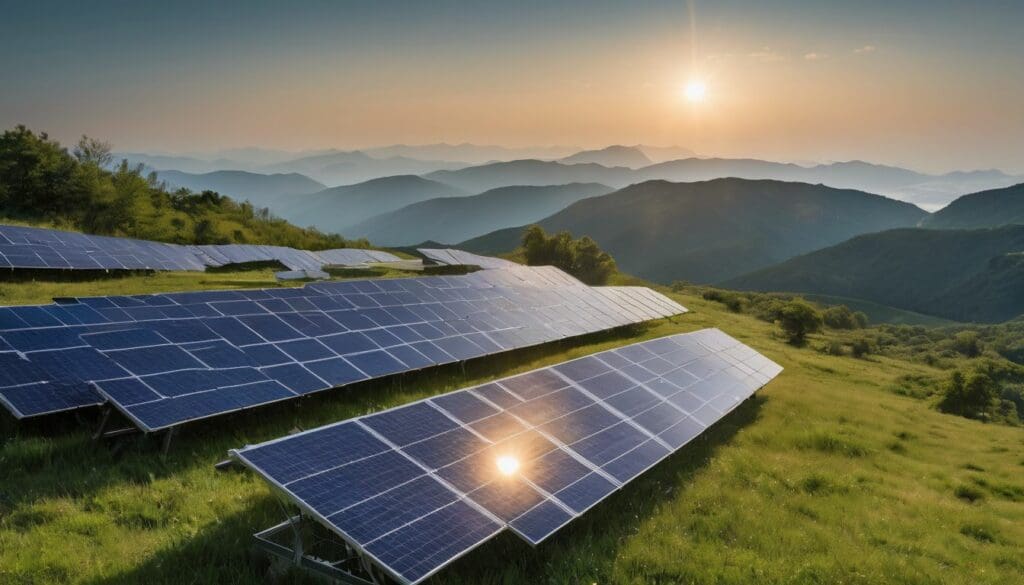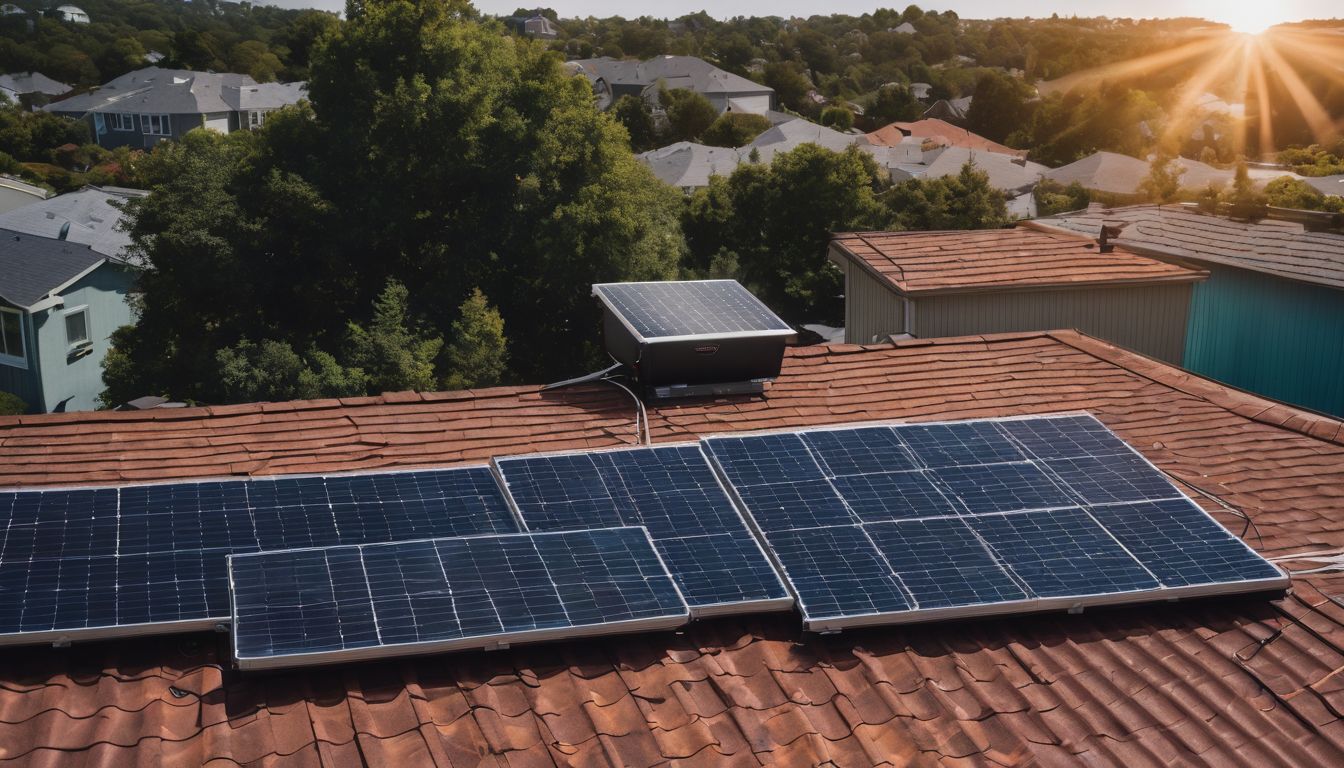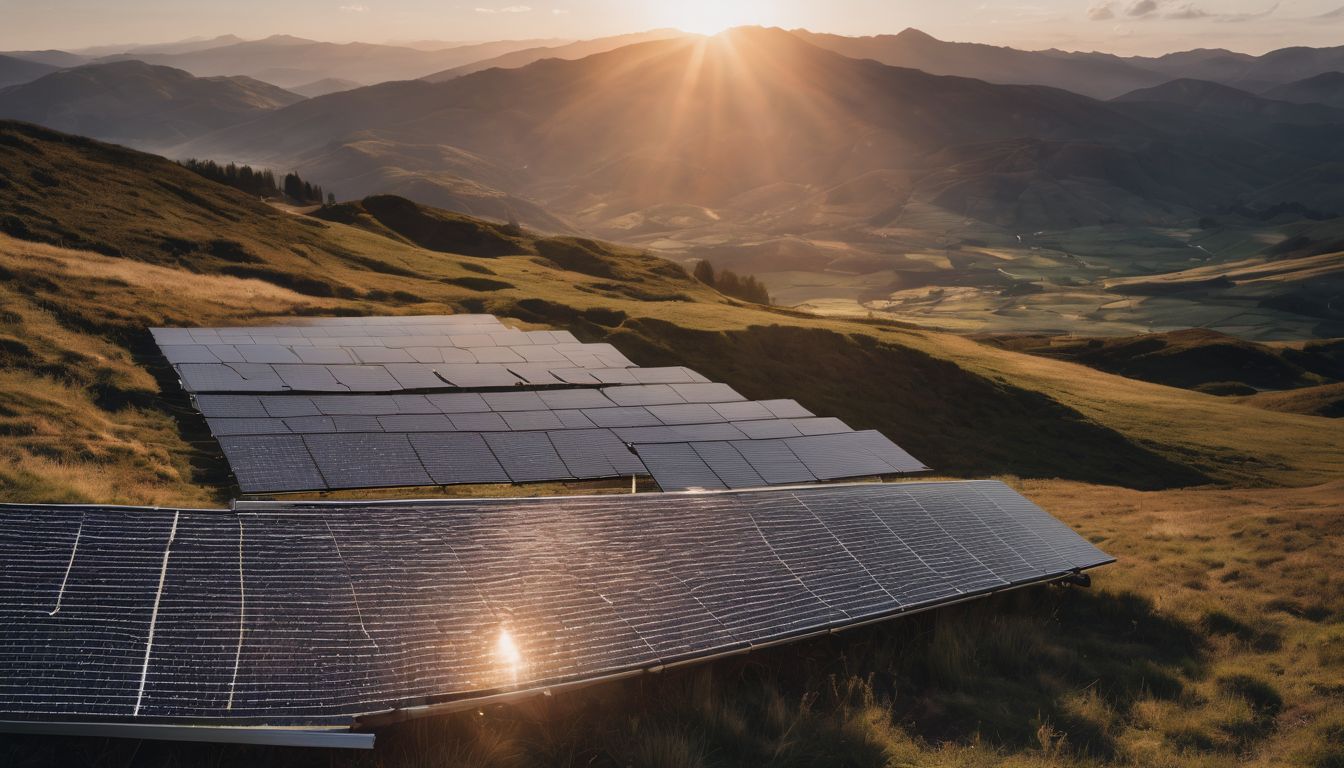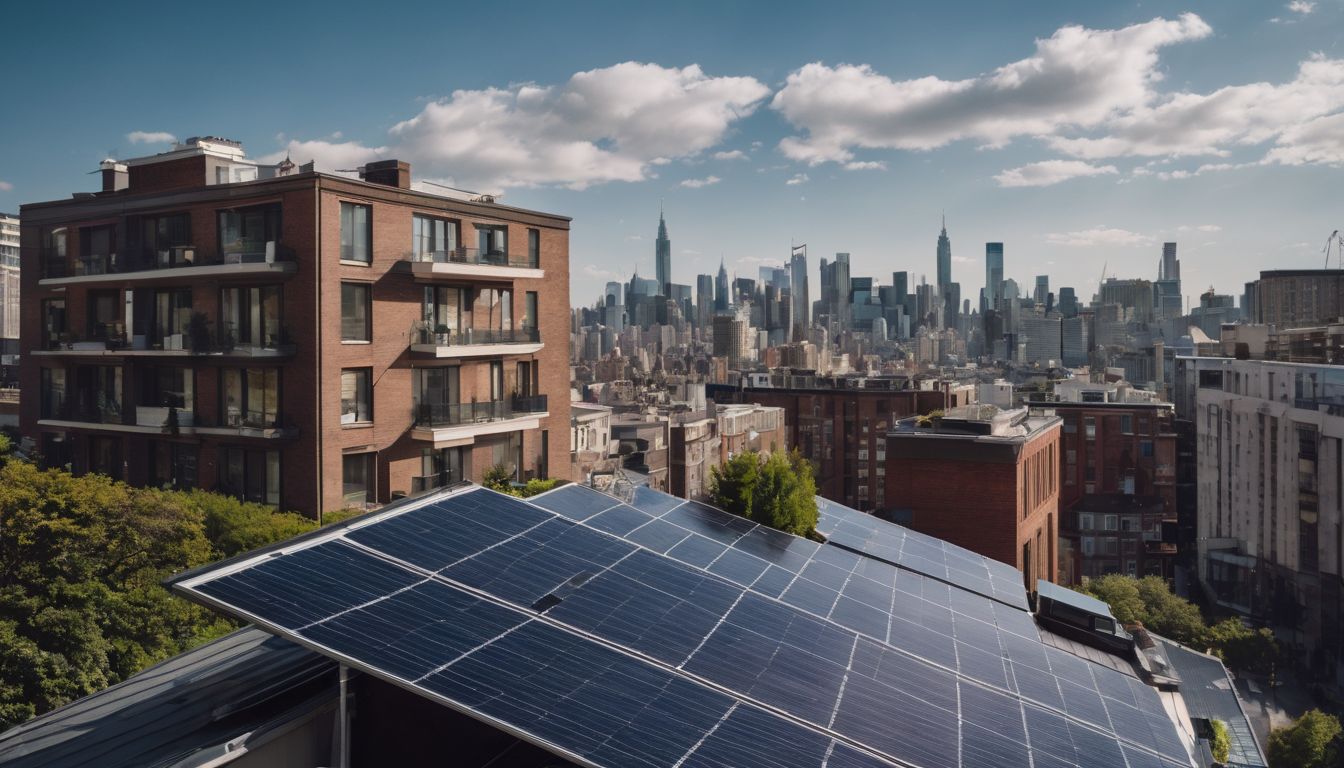Many people wonder if solar panels are really worth it. In fact, the global solar energy capacity has increased from 1.4 GW in 2000 to over 700 GW by 2020. This article will bust common myths and show you the bright side of harnessing the sun’s power.
Keep reading; it’s enlightening!
Key Takeaways
- Solar panels generate electricity even on cloudy days using the light that passes through clouds.
- Advancements in solar technology have made panels more efficient, with some converting up to 22% of sunlight into energy.
- Government incentives and financing options are available for people at all income levels to help make solar energy affordable.
- Proper installation ensures that solar panels will not damage roofs and can actually protect them over time.
- Energy storage systems allow solar power to be a reliable source of energy even when the sun isn’t out.
Myth #1: Solar Panels Don’t Work When It’s Cloudy
Contrary to popular belief, solar panels can still generate electricity on cloudy days. The diffuse light that filters through the clouds still allows for some level of energy production.
The reality of solar panel efficiency in cloudy weather
Many people believe that solar panels stop working on cloudy days, but this isn’t quite true. While it’s correct that solar panels generate more electricity in direct sunlight, they don’t shut down during overcast weather.
Clouds may reduce the intensity of sunlight reaching the panels; however, diffuse light still contributes to energy production. In fact, some cloud coverage can even lead to cooler temperatures which potentially enhance panel performance as excessive heat can reduce the efficiency of photovoltaic cells.
Photovoltaic technology is designed to capture a range of light wavelengths, meaning even when thick clouds are present, solar panels continue to work. They harness what’s known as indirect or diffused sunlight – the kind that filters through on a cloudy day.
Modern solar systems integrate smart inverters and optimisers which help maximise energy harvest from these less-than-ideal conditions. Thus, residents in areas with frequent cloudy skies still benefit from investing in renewable energy solutions like solar power without worrying about significant dips in their system’s productivity.
The impact of diffuse light on solar panels
Despite cloudy weather affecting solar panel efficiency, diffuse light still provides energy. Diffuse light refers to sunlight that reaches solar panels indirectly, often on overcast days.
This type of light is less intense than direct sunlight but can still generate electricity. Solar panels are designed to capture and convert diffuse light into power through photovoltaic cells.
Therefore, even during cloudy conditions, solar panels can produce a significant amount of electricity.
While direct sunlight is ideal for maximum efficiency, modern solar panels are efficient at capturing diffuse light as well. The ability to harness energy from diffused sunlight makes solar power a viable option even in regions with frequent cloud cover or during the winter months when the sun’s angle is lower.
Myth #2: Solar Panels Aren’t Efficient Enough
Understanding solar panel efficiency rates is crucial in dispelling this myth. Proper installation and regular maintenance also play a significant role in ensuring optimal performance of solar panels.
Understanding solar panel efficiency rates
Solar panel efficiency rates measure how effectively solar panels convert sunlight into electricity. The efficiency of a solar panel is determined by its ability to capture and convert sunlight into usable energy.
Higher efficiency means more electricity can be generated from the same amount of sunlight, which can lead to lower energy bills and greater cost savings over time. Factors that affect solar panel efficiency include the quality of the materials used, the design of the panel, and proper installation to maximise exposure to sunlight.
Solar panels have varying degrees of efficiency, with some models reaching up to 22% or more. Understanding these ratings helps in selecting the most suitable solar panels for specific energy needs while maximising space usage and budget considerations.
The importance of proper installation and maintenance
- Regular inspection and cleaning of solar panels ensures optimal performance and longevity.
- Proper installation by certified professionals minimises the risk of damage to the roof and maximises energy production.
- Routine maintenance includes checking for any shading from nearby trees or structures, ensuring unobstructed sunlight exposure.
- Monitoring system performance allows for early detection of any issues, ensuring uninterrupted energy generation.
- Ensuring effective ventilation around solar panels prevents overheating, which can affect their efficiency.
- Professional assessment and maintenance of electrical components ensure safety and smooth operation.
Myth #3: Solar Panels are Too Expensive
Solar energy is actually a cost-effective option, and there are various government incentives and financing options available to make solar panels more affordable for homeowners. The long-term savings from lower electricity bills also make solar energy a smart investment.
The cost effectiveness of solar energy
Solar energy offers significant cost savings over time. Solar panels require an initial investment, but they can significantly reduce or eliminate monthly electricity bills. Government incentives and financing options make solar energy accessible to more households, while the long-term benefits of reduced energy costs contribute to a more sustainable and affordable lifestyle.
Furthermore, the maintenance costs of solar panels are low compared to the potential long-term savings on electricity bills. As a result, investing in solar energy is not only environmentally friendly but also financially advantageous for individuals seeking clean and renewable energy solutions.
Government incentives and financing options
- The cost effectiveness of solar energy opens up opportunities for various government incentives and financing options that can further reduce the initial investment required.
- Government incentives such as tax credits, rebates, and grants are available at local, state, and federal levels to promote the adoption of solar energy.
- Some governments offer low – interest loans or financing programs to help homeowners and businesses afford the installation of solar panels.
- Solar renewable energy certificates (SRECs) allow owners of solar systems to generate additional income by selling their renewable energy credits to utilities.
- Power purchase agreements (PPAs) and solar leasing options provide an alternative route for obtaining solar power where individuals can benefit from a fixed monthly fee instead of outright purchasing the system.
- Community solar programs enable multiple individuals to share the benefits of a single solar panel installation.
Myth #4: Solar Panels Will Damage My Roof
Debunking the myth of roof damage: Many people worry that solar panels will cause damage to their roofs, but when installed properly, solar panels can actually protect and prolong the lifespan of your roof.
Proper installation and alignment are key to ensuring minimal impact on your roof’s integrity.
Debunking the myth of roof damage
Contrary to popular belief, properly installed solar panels do not damage roofs. Professional installation ensures that the panels are securely mounted without compromising the integrity of your roof.
It’s crucial to hire experienced installers who follow best practices for installation and alignment, reducing any risk of damage.
This misconception often stems from outdated information about early solar panel technology. Modern advancements have led to improved mounting systems that distribute weight evenly across the roof surface, minimising potential issues.
Importance of proper installation and alignment
- Proper placement is essential in maximising sun exposure and energy production.
- Aligning the panels correctly ensures optimal efficiency and performance.
- Installation by certified professionals guarantees adherence to safety standards and prevents potential issues.
- Careful positioning helps minimise any impact on the roof structure, ensuring longevity and stability.
- Regular maintenance and inspection further enhance the durability and effectiveness of solar panel systems.
- Well – aligned panels contribute to the overall aesthetic appeal of the property while harnessing clean energy.
Myth #5: Solar Energy is Not Reliable
Despite common belief, solar energy is actually quite reliable. With advancements in technology and the integration of energy storage systems, solar power can provide a consistent and stable source of electricity for both residential and commercial use.
The truth about solar reliability may surprise you!
The truth about solar energy reliability
Solar energy may seem unreliable, but the truth is that modern solar technology has made great strides in ensuring consistent power generation. Solar panels can still produce electricity on cloudy days, thanks to their ability to capture diffuse light.
Paired with energy storage systems, solar panels provide a reliable source of clean energy even when the sun isn’t shining brightly.
Moreover, advancements in solar panel design and installation have significantly enhanced their reliability and efficiency. With proper maintenance and alignment, solar panels offer a dependable source of sustainable power for environmentally conscious individuals seeking to reduce their environmental impact while enjoying the benefits of renewable energy.
The role of energy storage systems
Energy storage systems play a crucial role in ensuring the reliability of solar energy. These systems store excess energy generated during peak sunlight hours, allowing it to be used during periods of low sunlight or at night.
By integrating energy storage, solar power becomes more consistent and dependable, addressing concerns about its reliability. This technology also contributes to grid stability by providing backup power during outages and reducing reliance on traditional fossil fuel-based electricity generation.
Furthermore, energy storage systems enhance the overall efficiency and effectiveness of solar panels by optimising the use of generated electricity. Implementing these systems not only maximises the benefits of solar energy but also supports sustainable living by reducing dependence on non-renewable resources for backup power.
As environmental advocates, embracing this advanced approach to storing solar energy empowers individuals to contribute to conservation efforts and drive positive change towards a greener future.
Myth #6: Solar is Only for the Wealthy
Debunking the myth of solar being a luxury – The affordability of solar energy for all income levels, and how government incentives and financing options make it accessible to more people.
Debunking the myth of solar being a luxury
Solar energy is for everyone, not just the wealthy. The cost of solar panels has significantly decreased over the years, making it an affordable option for homeowners of all income levels.
Additionally, government incentives and financing options further contribute to the accessibility of solar energy. By switching to solar power, individuals can save on their electricity bills while also contributing to a cleaner and more sustainable environment.
Contrary to common belief, solar energy is no longer a luxury but rather a practical choice for those looking to reduce their carbon footprint and lower their energy expenses. Whether you own your home or are renting, there are now accessible options for harnessing the power of the sun in an affordable and environmentally friendly way.
The affordability of solar energy for all income levels
Solar energy is accessible to everyone, regardless of income level. The upfront cost may seem high, but the long-term savings from reduced electricity bills make it a cost-effective choice for households of all financial backgrounds.
Government incentives and financing options further improve affordability, allowing more people to invest in solar panels without straining their budget.
Households can benefit from solar energy without having to worry about excessive costs. Even low-income families can take advantage of this sustainable power source and contribute to environmental conservation efforts by reducing reliance on traditional grid electricity.
With affordable options available, more individuals have the opportunity to embrace clean energy solutions.
Conclusion
In conclusion, the myths surrounding solar energy have been debunked. Solar panels can still work efficiently in cloudy weather due to their ability to harness diffuse light. Proper installation and maintenance are key factors that determine the efficiency of solar panels, making them a reliable source of energy.
The affordability of solar energy is evident through government incentives and financing options, ensuring that it is accessible for all income levels. With proper installation and alignment, solar panels do not damage roofs, and their reliability can be enhanced with energy storage systems.
Contrary to misconceptions, solar energy is an affordable and reliable option for environmentally conscious individuals looking to support conservation efforts.
FAQs
1. Are solar panels really expensive to install?
No, the reality of solar power is that it’s becoming more affordable, debunking the myth that solar installation costs are too high for most people.
2. Can photovoltaic panels produce energy on cloudy days?
Yes, photovoltaic panels can still generate electricity under cloudy skies, proving the common misconception about solar power needing clear skies wrong.
3. Is it true that solar energy isn’t reliable?
That’s a myth! Solar panel reliability has improved significantly with green technology advancements, making them a dependable source of energy.
4. Do solar panels have a negative environmental impact?
Contrary to myths, the environmental impact of solar energy is positive; they provide clean, renewable energy and are an efficient way to reduce carbon footprints.
5. Aren’t there big risks associated with using solar panels?
Debunking another myth: The risks of solar panels are minimal and comparable to any other home improvement – they’re generally safe and beneficial for both homeowners and the environment.





